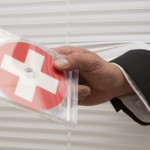 On March 13, 2018 we posted, IRS to End OVDP Sept. 28 - Last Chance for Taxpayers With Undisclosed Foreign Assets! where we discussed that the Internal Revenue Service announced (IR-2018-52) that it will begin to ramp down the 2014 Offshore Voluntary Disclosure Program (OVDP) and close the program on Sept. 28, 2018. By alerting taxpayers now, the IRS intends that any U.S. taxpayers with undisclosed foreign financial assets have time to use the OVDP before the program closes.
On March 13, 2018 we posted, IRS to End OVDP Sept. 28 - Last Chance for Taxpayers With Undisclosed Foreign Assets! where we discussed that the Internal Revenue Service announced (IR-2018-52) that it will begin to ramp down the 2014 Offshore Voluntary Disclosure Program (OVDP) and close the program on Sept. 28, 2018. By alerting taxpayers now, the IRS intends that any U.S. taxpayers with undisclosed foreign financial assets have time to use the OVDP before the program closes.
When the IRS announced that it was ending the program, it noted that taxpayers “who still wish to come forward have time to do so.” It has been widely assumed that this meant that taxpayers had until September 2018 to take full advantage of the program if they so choose.
Now according to Law360 that is no longer true. Until recently, taxpayers could confirm their eligibility for the program before providing the IRS evidence of potential criminal violations and, per the IRS announcement, such taxpayers had until the end of August to do so. Now, due to processing delays of up to three months for requests already made, the deadline for taxpayers to confirm their eligibility has already passed. Without some extension of the September deadline by the IRS, a taxpayer can only attempt to enter the program blind, risking exposing criminal activity to the IRS without receiving immunity in return.
In order to be eligible to participate in OVDP and receive the benefits of immunity and reduced penalties, taxpayers must not be already under IRS investigation, audit or exam, and their undisclosed foreign assets must not have already been disclosed to the IRS by their respective financial institutions. As taxpayers are not always aware if they are under investigation or audit, the IRS has allowed taxpayers to obtain pre-clearance letters that confirm their eligibility for the program. While it is not necessary to participate in OVDP, these letters are an important first step in participating in the program. They are not, however, an application to the OVDP program.
Every participant should try and receive a pre-clearance letter before applying. In an OVDP application, taxpayers must provide the IRS a roadmap of their potentially criminal activity. They must reveal where all the proverbial bodies are buried. The pre-clearance process gives taxpayers the peace of mind that when they give the IRS this roadmap they will not, assuming they are otherwise accepted into the program, face criminal prosecution. If they do not obtain the pre-clearance letter, having submitted the information only to find out they are ineligible, they have not only revealed their potentially criminal activity to a government already investigating them, but just handed over a trove of incriminating materials.
Prior to the announcement of OVDP's termination on September 28, 2018, a taxpayer typically received a pre-clearance letter about 2-3 weeks after requesting it. When the IRS announced it was closing the program, it updated its FAQs to indicate that participants should expect the process to take 30 days.
As one can imagine, news of the program's imminent shutdown has caused a large number of taxpayers to begin the process of obtaining pre-clearance letters, a development that appears to have caught the IRS off guard. Agents handling such requests have been telling potential applicants that the process is so delayed that they should not expect to receive a pre-clearance letter for two to three months.
While not saying it directly, if taxpayers want to proceed with a voluntary disclosure under OVDP, they may do so without the protections afforded by a pre-clearance letter. They must run the risk of providing the government every piece of information necessary to prove criminal charges against them only to find out that the government is already investigating them.
This issue is entirely fixable by the IRS. They could, for example, extend the deadline for applicants in light of these delays. They could allow taxpayers to file their OVDP applications within a certain period of time after receiving the pre-clearance letter so long as the request for a pre-clearance letter was filed before the Sept. 28, 2018, deadline.
It is unlikely the IRS will extend these deadlines or take any other measures to fix these delays. The IRS’ rationale for ending the program was that by this point, taxpayers “have had several years to come into compliance with U.S. tax laws under the OVDP Program. In other words, the IRS is unlikely to sympathize with taxpayers who have waited until now to proceed with a disclosure.
 Every OVDP applicant is different and each must decide for himself or herself whether to take the risk of filing an application without a pre-clearance letter. At its core, the OVDP program provides certainty. Participants know that they will not face criminal liability for their past actions. They pay reduced penalties, taxes and interest and are able to move forward with their lives unencumbered by their IRS tax issues. Now, however, in hopes of obtaining that certainty, taxpayers must assume some additional risk.
Every OVDP applicant is different and each must decide for himself or herself whether to take the risk of filing an application without a pre-clearance letter. At its core, the OVDP program provides certainty. Participants know that they will not face criminal liability for their past actions. They pay reduced penalties, taxes and interest and are able to move forward with their lives unencumbered by their IRS tax issues. Now, however, in hopes of obtaining that certainty, taxpayers must assume some additional risk.
Some potential OVDP participants will choose to proceed with the disclosure because to them the potential benefit of future certainty outweighs the risk of potential ineligibility. To others, the fear of showing the government all the skeletons in their closest without assurances they will receive the benefits of immunity will prove too much for them.
Each taxpayer should consult with an Experience Tax Attorney, to advise them regarding their choices for addressing their previously undisclosed foreign income, who can inform them of the risks and benefits of each path forward.
Read more at: Tax Times blog












